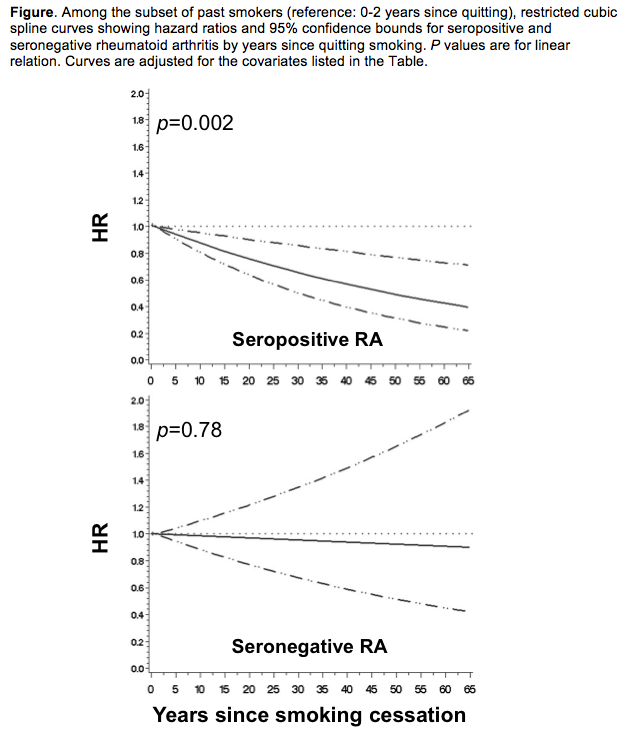Session Information
Date: Monday, October 22, 2018
Session Type: ACR Concurrent Abstract Session
Session Time: 4:30PM-6:00PM
Background/Purpose: Compared to never smoking, past and current smoking are both associated with increased risk of seropositive rheumatoid arthritis (RA). Thus, smoking cessation may delay or even prevent RA, but previous investigations were limited for definitive conclusions by short follow-up. Therefore, we investigated the impact and timing of smoking cessation on RA risk using two large prospective cohorts with lengthy follow-up.
Methods: We investigated smoking cessation and RA risk in the Nurses’ Health Study (NHS, 1976-2014) and the NHSII (1989-2015). Smoking exposure data and covariates were obtained prospectively by biennial surveys. Women self-reported RA and medical record review confirmed RA by ACR criteria. Serologic status of RA was validated by rheumatoid factor (RF) and/or anti-cyclic citrullinated peptide (anti-CCP) by chart review. Using pooled data, Cox regression estimated HRs and 95%CIs for RA phenotypes (seropositive, seronegative) by smoking status and years since cessation adjusting for possible confounders. Among past smokers, we used restricted cubic spline curves to investigate years since cessation and risk of RA phenotypes compared to recent quitters.
Results: Among 230,732 women, we identified 1,528 incident RA cases (n=969 seropositive, n=559 seronegative) during 6,037,151 person-years of follow-up. In the NHS in 1988, mean age was 54.3 years (SD 7.2), 18.8% were current smokers, and 36% were past smokers. In the NHSII in 1989, mean age was 34.4 years (SD 4.7), 13% were current smokers, and 21% were past smokers. Compared to never smoking, current smoking increased risk for seropositive RA (multivariable HR 1.67, 95%CI 1.38,2.01), but not seronegative RA (HR 1.20, 95%CI 0.93,1.55, Table). A modestly elevated RA risk was still detectable for seropositive RA (multivariable HR 1.30, 95%CI 1.01,1.68) 30 years after quitting smoking compared to never smoking. After smoking cessation, seropositive RA risk decreased over time compared to recent quitters (0-2 years) (Figure). Among the subset of past smokers, there was a linear relation between years since smoking cessation and reduced risk for seropositive RA (p=0.002), but not seronegative RA (p=0.78). Compared to recent quitters (<5 years), those who quit >30 years ago had HR of 0.63 (95%CI 0.44,0.90) for seropositive RA.
Conclusion: In this large prospective study with up to 38 years of follow-up, past smokers had significantly reduced risk for seropositive RA after quitting smoking, although residual elevated risk for RA remained even 30 years after quitting compared to never smokers. These results provide evidence that sustained smoking cessation reduces RA risk.
To cite this abstract in AMA style:
Liu X, Leatherwood C, Tedeschi SK, Barbhaiya M, Speyer C, Lu B, Costenbader K, Karlson E, Sparks JA. Impact and Timing of Smoking Cessation on Reducing Risk for Seropositive Rheumatoid Arthritis Among Women [abstract]. Arthritis Rheumatol. 2018; 70 (suppl 9). https://acrabstracts.org/abstract/impact-and-timing-of-smoking-cessation-on-reducing-risk-for-seropositive-rheumatoid-arthritis-among-women/. Accessed .« Back to 2018 ACR/ARHP Annual Meeting
ACR Meeting Abstracts - https://acrabstracts.org/abstract/impact-and-timing-of-smoking-cessation-on-reducing-risk-for-seropositive-rheumatoid-arthritis-among-women/


